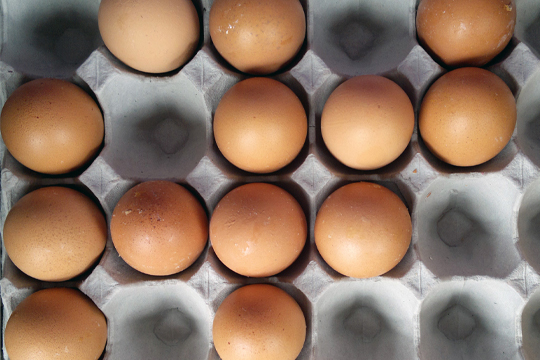
Reducing Food Waste in Foodservice
October 16, 2018 by Doreen Garelick, Dietetic Intern
Our intern Doreen attended a food waste summit for restaurants and compiled these tips to help food service operators redirect…
Nutrition 101
March 11, 2014

We dispel the myth that the cholesterol content of eggs significantly impacts your cholesterol levels.
Cholesterol is a fatty substance found in animal-based foods and also made in the body. The body uses cholesterol to make vitamin D and hormones, to coat the outer lining of cells and to help digest fats. Though we do need some cholesterol in the body to keep us healthy, high levels of cholesterol in the blood may lead to plaque buildup, narrow arteries and increased risk of heart disease. Eggs are often stigmatized due to the yolk’s high cholesterol content– about 200 mg for a large egg -- or 2/3 the daily recommended amount.
In 2012 a very controversial study on egg consumption was published in the journal Atherosclerosis. Researchers compiled data on smoking and egg consumption in patients visiting heart and vascular clinics and looked at the amount of plaque buildup in each patient. They found that both tobacco smoking and egg yolk consumption accelerated atherosclerosis (plaque buildup) in a similar way and recommended that persons at risk of heart disease limit consumption of egg yolks. However, the media took these findings to mean that eating eggs is as harmful as smoking and generated sensationalized headlines with this message.
In reality, eggs are not the culprit that the press made them out to be. This one particular study had considerable limitations; it did not consider exercise or other dietary factors that might influence progression of atherosclerosis and used self-reported data (not always the most reliable). Moreover, the study was conducted among a high risk population already visiting a vascular clinic, so the results are difficult to generalize for healthy individuals.
Other studies have shown mixed results on the effect of egg yolk consumption on blood cholesterol and on heart health. Some studies have found no relationship between egg consumption and total cholesterol concentration, while others have shown an inverse relationship and some a positive relationship. In one Japanese study, eating eggs almost daily was not associated with any adverse effects on incidence of coronary heart disease and a US study did not find a positive association between egg consumption and increased risk of death from coronary heart disease (CHD) and stroke.
Researchers now agree that dietary cholesterol is not the main determinant of cholesterol levels in the blood and that saturated and trans-fats have a greater impact on serum cholesterol and risk of heart disease. This means that eating foods with high levels of saturated fat such as marbled beef and butter is more likely to raise your cholesterol than eating an egg yolk.
Whole eggs are a good source of high quality protein (about 6 grams per large egg), one of the few food sources of vitamin D and contain vitamin B12, riboflavin and folate. Egg yolks are also rich in choline, an essential nutrient for cell structure, fat metabolism, muscle control and memory, and they are one of the best sources of biotin -- an important B-complex vitamin. Eggs are also affordable, versatile and easy to cook!
If you have a preexisting heart condition or have been diagnosed with diabetes or high cholesterol, you should be cautious about consumption of egg yolks and consider limiting your intake to 2-3 per week. If you are in otherwise good health, go ahead and eat your eggs, but limit yourself to an average of one yolk per day, supplemented with heart-healthy sides such as whole grain toast and fruit. You can also use 1 whole egg and 2 egg whites to make a heart healthy omelet filled with fiber-rich vegetables.
Have you been unnecessarily avoiding eggs because of their high cholesterol content? Let us know in the comments section below!

October 16, 2018 by Doreen Garelick, Dietetic Intern
Our intern Doreen attended a food waste summit for restaurants and compiled these tips to help food service operators redirect food waste from landfills.
Nutrition 101

Nutrition 101
September 26, 2018 by Doreen Garelick, Dietetic Intern
Ever notice headlines about rapid weightloss? Dietetic Intern Doreen Garelick looks deeper into a recent eye-catching headline to see if there's any truth behind it.
Connect
 Follow us on Twitter
Follow us on Twitter Friend us on Facebook
Friend us on Facebook Follow us on Pinterest
Follow us on Pinterest Follow us on Instagram
Follow us on Instagram Read our Blog
Read our Blog Watch videos on YouTube
Watch videos on YouTube Watch videos on Vimeo
Watch videos on Vimeo Connect with us on Linkedin
Connect with us on Linkedin Find us on Foursquare
Find us on Foursquare
Tweets by @SPEcertifiedBlog Search
Categories
SPE Certified Newsletter
Sign up for news on the latest SPE-certified venues, events and SPE updates.
We will never share your personal information with a third party.